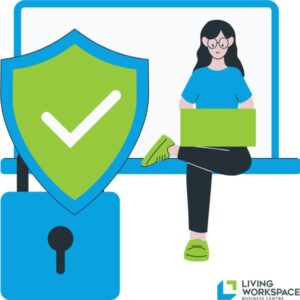Business isn’t just about growth, it’s also about protection
When you’re running a business, most of the conversation focuses on the fun (and important) stuff – attracting clients, creating offers, building a website, growing on social media. But one topic often gets overlooked – protecting yourself when things don’t go to plan.
This post isn’t meant to scare you. It’s about setting up your business and your personal life to be secure, respected, and protected, so you can keep doing what you love with peace of mind.
Let’s explore the essential (but often forgotten) ways to protect your business, your reputation, your assets, and yourself.

1: Stop Using Your Home Address. Here’s Why.
Many Australian businesses are registered using the owner’s personal home address. It’s simple, cheap, and seems harmless… until something goes wrong.
ASIC makes it surprisingly easy for anyone to look up a business address – all it takes is $10 and a few clicks. That means clients, competitors, or even strangers can find your home.
A better alternative?
• A virtual office (like ours!) gives you a real, prestigious address where clients could show up if needed
• A PO Box (though this won’t work for ASIC)
• Register through your accountant or lawyer
💡 Google Business tip: You can use a virtual office address. We help clients list with ours all the time – no issues. You’ll even get that all-important pin on the map.
Caution: Not all virtual offices are created equal. Look for:
• Transparent pricing
• Flexible, month-to-month terms
• A real, physical location with photos and a phone number
• Supportive service (not just a faceless sign-up form)
2: Choose the Right Business Structure
Your business structure isn’t just a formality – it determines your personal liability.
• Sole trader: You and the business are one. You’re personally liable for all debts and legal issues.
• Company: A separate legal entity. You’ll have directors’ obligations, but you’ll also have personal liability protection in most cases.
Not sure which is right for you? This is worth a chat with a lawyer or accountant. And make sure you do your own research into the various different business structures and what might be best for you. The right structure depends on your industry, your risk profile, and your long-term goals.
3: Insurance: It’s Not Just Public Liability
Most people know about public liability insurance – it covers accidents or injuries related to your business activities. But depending on what you do, you may also need:
• Professional indemnity insurance for advice-based work (e.g. coaches, consultants, designers, lawyers)
• Cyber insurance to protect your data and client info
• Product liability if you sell or manufacture anything physical
• Management liability if you have a company with directors
Insurance gives you a financial and legal buffer when things go wrong. It’s one of the smartest investments a small business owner can make.
4: Contracts: Your Non-Negotiable Safety Net
Whether you’re offering coaching, photography, consulting , or even cake decorating – if you’re not using a written contract, you’re taking an unnecessary risk.
A good contract should include:
• Scope of work (what is and isn’t included)
• Fees, timelines, and payment terms
• Termination conditions (by you or the client)
• Refund or reschedule policies
• Dispute resolution steps
• Liability limitations (how much you can be held responsible for)
Contracts aren’t about being confrontational. They’re about clarity, respect, and professionalism – for both parties.
Because they are so incredibly important to get right, consulting a lawyer is the best way to make sure you’re covered. The next best option is to buy a reputable template online and customise it for your needs. Providers like Foundd Legal, Ready to Boss Legal, Lawpath, and others (just search ‘legal contract template Australia’) are Australian based and written by lawyers. Avoid buying general contracts from Etsy or other online marketplaces as you can’t verify the qualifications of the person selling them. They might look pretty, but it’s possible they are no more protective than something you could have just written yourself without guidance.
5: Professional Registrations & Legal Requirements
In Australia, you’ll generally need:
• An ABN
• A registered business name (if operating under something other than your own name)
• To choose your business structure (sole trader, company, partnership, etc.)
State-specific requirements can apply, too. Be sure to check your local business authority.
Depending on your profession, you may also need specific licences or registrations.
The government business website is a wealth of information about what you need to start a business, as well as planning, grants information, and other things you need to know to minimise risks.
6:Terms & Conditions + Privacy Policy: Website Basics
If you have a website, you’re legally required to have:
• Privacy Policy – outlines how you collect, store, and use visitor data
• Terms & Conditions – especially important if you’re selling online, offering services, or taking bookings
You don’t have to write these yourself. Speak to a lawyer, or use a reputable legal template provider that understands Australian law. Check out the links in Section 4 (Contracts) above for legal template providers.
7: Other Ways to Stay Protected (That People Forget)
A few lesser-known (but powerful) ways to stay safe:
• Succession planning – who takes over your business if you can’t operate?
• Password management – use tools like 1Password or LastPass to secure client data
• Responsible person – someone who can act on your behalf if needed (especially relevant for sole traders)
• Back up your business data regularly – cloud-based tools or external hard drives can help prevent disasters.
These aren’t things you need to do all at once, but they are worth thinking about now so you’re not caught off-guard later.
Why This Matters: A Real Story
Recently, a well-known Australian businesswoman shared a confronting story:
A disgruntled online client, despite being offered a refund, became aggressive and threatened to visit her at her home address.
She was shocked – she didn’t realise her address was publicly visible through ASIC. Sadly, she’s not alone. In the comments, dozens of other professionals admitted they had no idea how exposed they were.

This blog post was written as a response because we want you to know: you don’t have to choose between professionalism and privacy.
How to protect your business in Australia – bringing it all together
You’ve worked hard to build something real. That deserves to be protected – not just from the obvious risks, but from the quiet vulnerabilities that most people never think about until it’s too late.
By getting the right address, structure, insurance, legal documents, and registrations in place, you’re not just protecting your business – you’re protecting yourself, your family, and your future.
Want to upgrade your business presence without giving up your privacy? Explore our Virtual Office service.
Disclaimer: This article is for general informational purposes only and is not intended to provide legal advice. Living Workspace does not employ legal professionals and does not offer legal or financial services. We recommend seeking advice from a qualified legal practitioner for your specific circumstances.
